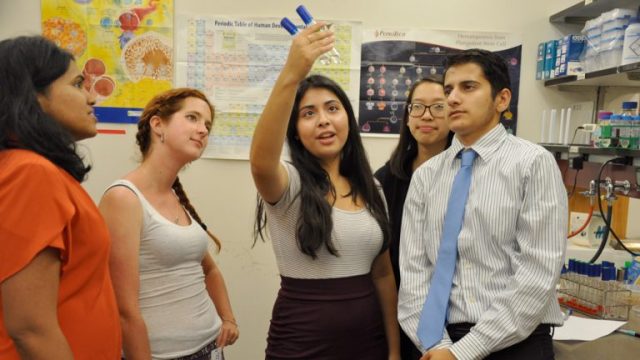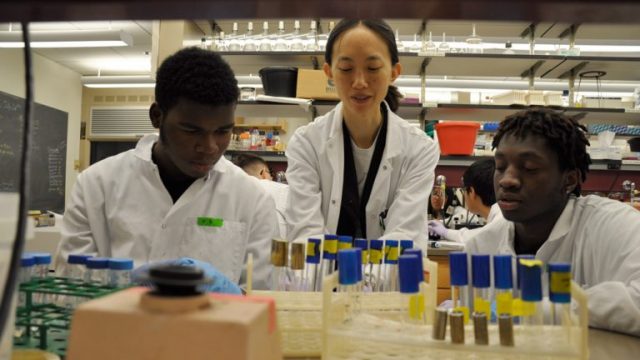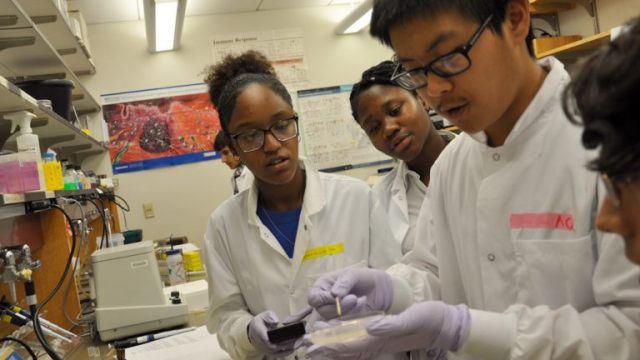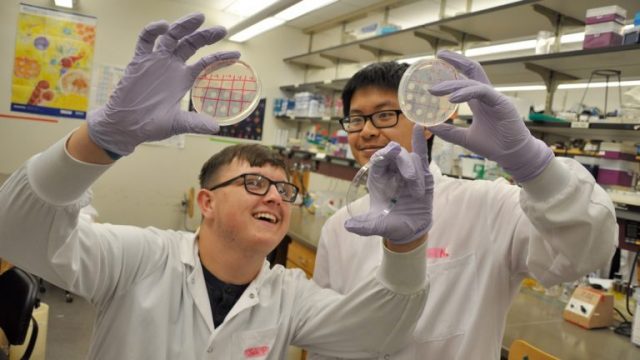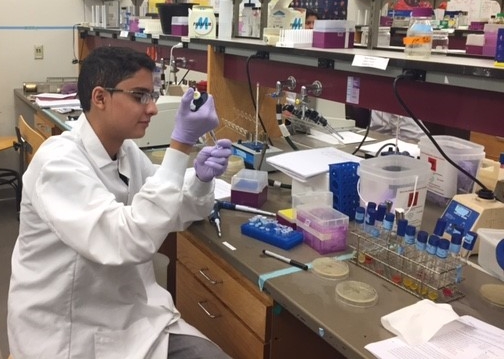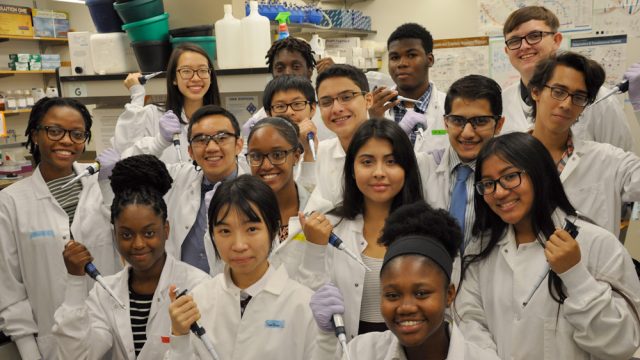The Knox Scholars for Biomedical Research Program
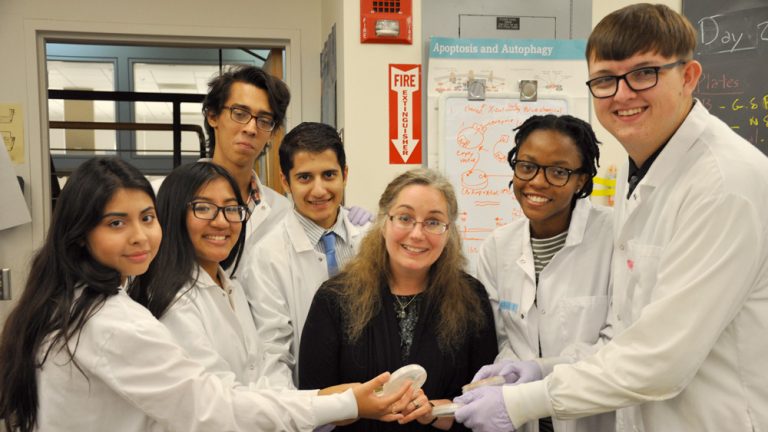
Photo courtesy of the Massachusetts Institute of Technology | Knox Scholars Program.
Project Website(s)
-
Project Description
Health Resources in Action (HRiA) received a five-year SEPA grant from the National Institute of General Medical Sciences, National Institutes of Health, to expand its LEAH* STEM (science, technology, engineering, and math) education program for Boston and Cambridge public high school students. HRiA partnered with the Boston Private Industry Council and Massachusetts Institute of Technology (MIT) for the LEAH Knox Scholars for Biomedical Research Program, which provides opportunities for high school students to get a head start towards careers as leaders in biomedical research.
HRiA’s LEAH project (Leaders through Education, Action and Hope) is a STEM, college readiness, and workforce development for Boston public school students. “We are thrilled to receive this NIH grant to support the mission of the LEAH Project. These funds allow the LEAH Project to provide hands-on lab experiences for our high school students, many of whom do not have science labs in schools,” commented Lisa Aslan, LEAH Program Manager.
The LEAH Knox Scholars program offers two years of support for high school students that include the following.
- Training in biology lab skills through a 4-week lab experience at MIT as rising juniors.
- STEM teaching and mentorship for elementary school students through the LEAH program.
- Summer research internships throughout Boston’s world-class research labs as rising seniors.
- College admissions counseling through LEAH.
A 2016 report published authored by Robert Sege, MD, PhD, reported that only 1% of NIH award recipients are Black scientists, and traced the under-representation all the way back to high school. Based on this insight, the LEAH Knox Scholars program will provide minority students with the solid foundation needed to continue their science education in college and beyond. Dr. Sege commented, “The LEAH Knox Scholars program exemplifies HRiA’s commitment to racial equity, and our close ties with area universities and hospitals.”
The program is named after William J. Knox, Jr., PhD, the grandson of slaves, who went on to earn degrees from Harvard and MIT. Dr. Knox contributed to the Manhattan project and had a productive career at Eastman Kodak. “My grandfather had to sleep in the kitchen at Harvard, because Black men were not allowed in the dorms,” said Lynn Porter, MD, a Boston pediatrician and advisor to the program.
During Summer 2017, HRiA and MIT enrolled 16 high school students in a LEAH pilot. This first cohort and their families were welcomed to the program by Nobel Laureate Phillip Sharp, PhD, MIT biology department Chair Alan Grossman, PhD, Robert Sege, MD/PhD, and Lynn Porter, MD. Dr. Sharp reminded everyone that “a college education is a path to freedom.” The students completed the pilot summer lab course, under the direction of Drs. Mandana Sassanfar and Vanessa Cheung at MIT.
The second cohort of Knox Scholars are scheduled to participate in the summer program from July 9, 2018 through August 10, 2018. The program is cost free.
*About The LEAH Project at Health Resources in Action
The Leaders through Education Action and Hope (LEAH) Project is a STEM, college readiness, and workforce development program for Boston Public School (BPS) students. Established in 2005 through the Boston Public Schools (BPS), the LEAH Project has a mission to cultivate the power of youth leaders to transform their lives and communities through science, education, and service. LEAH joined HRiA in 2013. HRiA is a national nonprofit public health institute located in Boston with a mission to help people live healthier lives and build healthy communities through prevention, health promotion, policy and research. Additional information is available at www.leahproject.org and www.hria.org.
-
Abstract
Although the health of Americans is improving, disparities of health remain. Differences in health status are well documented across racial groups, and for a variety of diseases. For example, in 2013, Black Americans continued to experience higher age-adjusted death rates than Whites and had double the rates of death due to common preventable conditions: hypertension, suicide, and pneumonia and influenza. Diversity in scientific research benefits the workforce and society at large. Yet, researchers are more likely to be White, potentially causing discomfort and reluctance among non-White individuals to join research studies. Members of minority groups together constitute more than 30% of the U.S. population, however they represent less than 18% of clinical trial participants. In addition, in 2015, only 1.6% of all NIH Senior Investigators (tenured) were Black, Non-Hispanic, and just 3.2% were Hispanic.
Biomedical scientists typically develop their career interests in high school, but many high school students, particularly in low-income communities, do not have equal access to the rigorous academic preparation required for entry into the biomedical research field. This project aims to bridge the gap for high school students of color, with a particular focus on Black and Hispanics, in the Greater Boston Area to provide opportunities to receive vigorous academic and experiential stimulation over two years.
Program Title: LEAH Knox Scholars in Biomedical Research program
Goal: Attract and retain up to 230 (46 per year x 5) minority high school-aged sophomores, juniors and seniors from the Greater Boston Area, over five years, into the field of biomedical science and research through a two-year, didactic and experiential program combining a youth development approach, didactic learning, laboratory work experiences, and mentorship opportunities.
Specific Aims: (1) Engage participants in the world of biomedicine through exposure to interesting activities, research, and professions in various biomedicine disciplines; (2) Retain their engagement in science through a work-study opportunity in a professional MIT laboratory; (3) Sustain participants’ interest in science/biomedicine through mentorships with a professional scientist; (4) Provide peer-tutoring skills,workforce development, and college readiness training to all participants.
The primary anticipated outcome of this program is to create, implement, and disseminate a new model to attract, retain and support minority students into the field of science will be developed, implemented and ready for dissemination in other urban areas, which will, in time, increase the diversity of professional research scientists in the United States. This program will incorporate the Next Generation Science Standards into the summer lab program curriculum, addressing Goals 2 and 4.
-
Additional Information
Knox Scholars Participant Reviews — Summer 2017
I liked that we were able to identify bacteria from a local area. My favorite thing about working at MIT was being able to get a real-life lab experience, and I liked that our instructors were really helpful and understanding.
My favorite experiment of the summer was when we went to the Charles River and collected a bottle of water from the river, and then poured the water on different gels and cultivated bacteria. The professors at MIT are nice and know a lot, and my peers were friendly and helpful. The people, food, and the labs in the LEAH Knox Scholars program are the best!
Not only did we have the opportunity to work in MIT’s labs with their equipment and conduct intense experiments, but we also got to work with MIT professors and instructors. My peers and professors were very willing to help and concerned with helping each other, and it was also beneficial to be surrounded by people who loved science. My favorite experiment was the sporulation assay, because I was able to develop the procedure on my own and see great results.
I loved the experience of meeting the scholars and professors from MIT, as well as the environment and the workplace. Whenever we had lunches with the professors or students from MIT, we also had the opportunity to ask a lot of questions, which was a highlight. The instructors were incredibly knowledgeable and helpful whenever I needed help with anything. I really enjoyed the UV assays although I had to do it a dozen times. I feel like each time we did it, we got better.
I especially liked the UV experiment, because I liked figuring out which level of UV caused cell death. I also enjoyed getting to know my instructors and peers.
The worms, even though they were really gross, were also very fascinating, especially seeing the different types. My favorite part about working at MIT was the instructors. I liked how easy they were to talk to because it is not usually as easy for me to do so.
Source: https://biology.mit.edu/outreach/leah-knox-scholars-program/leah-knox-scholar-testimonials/


